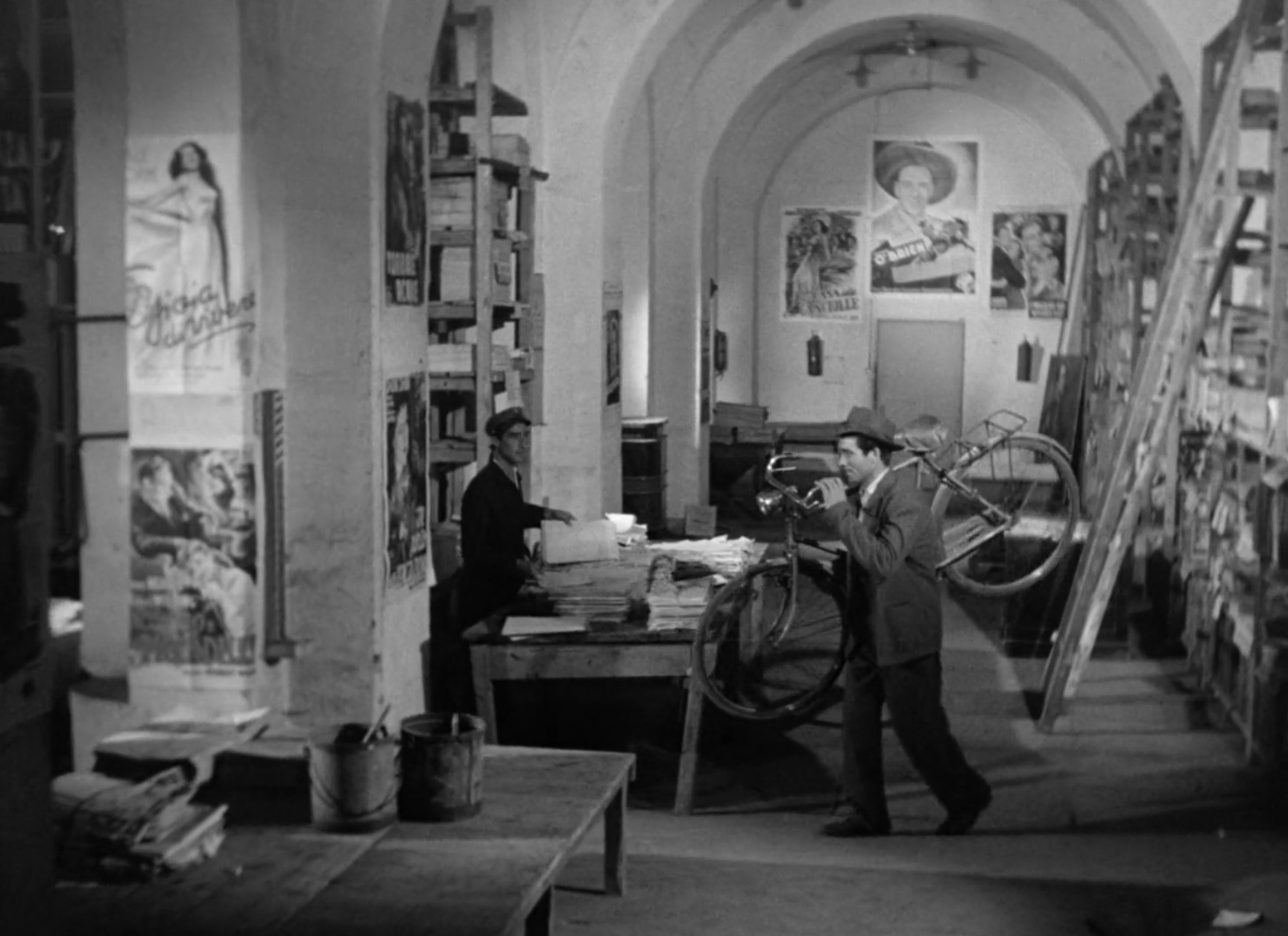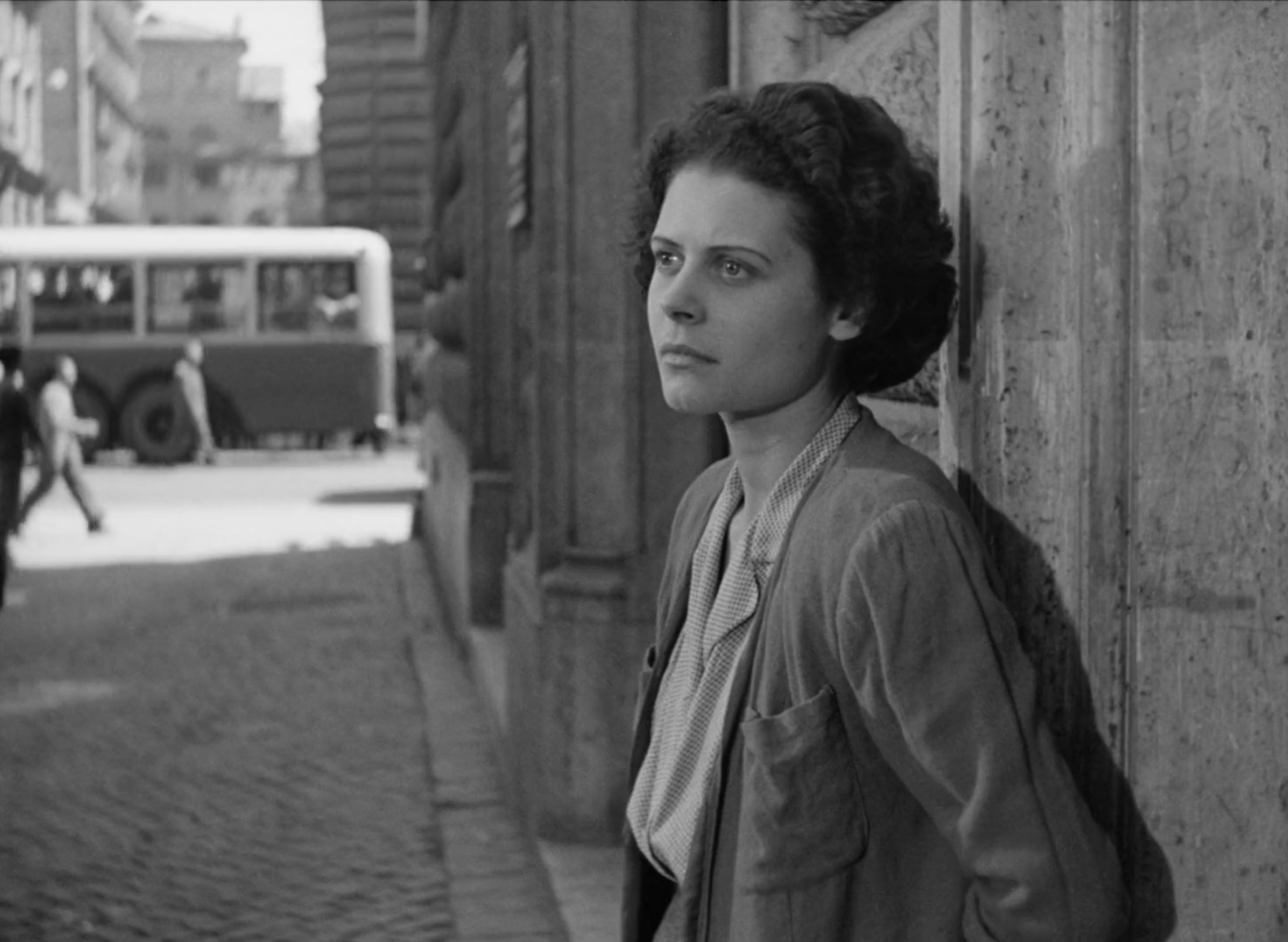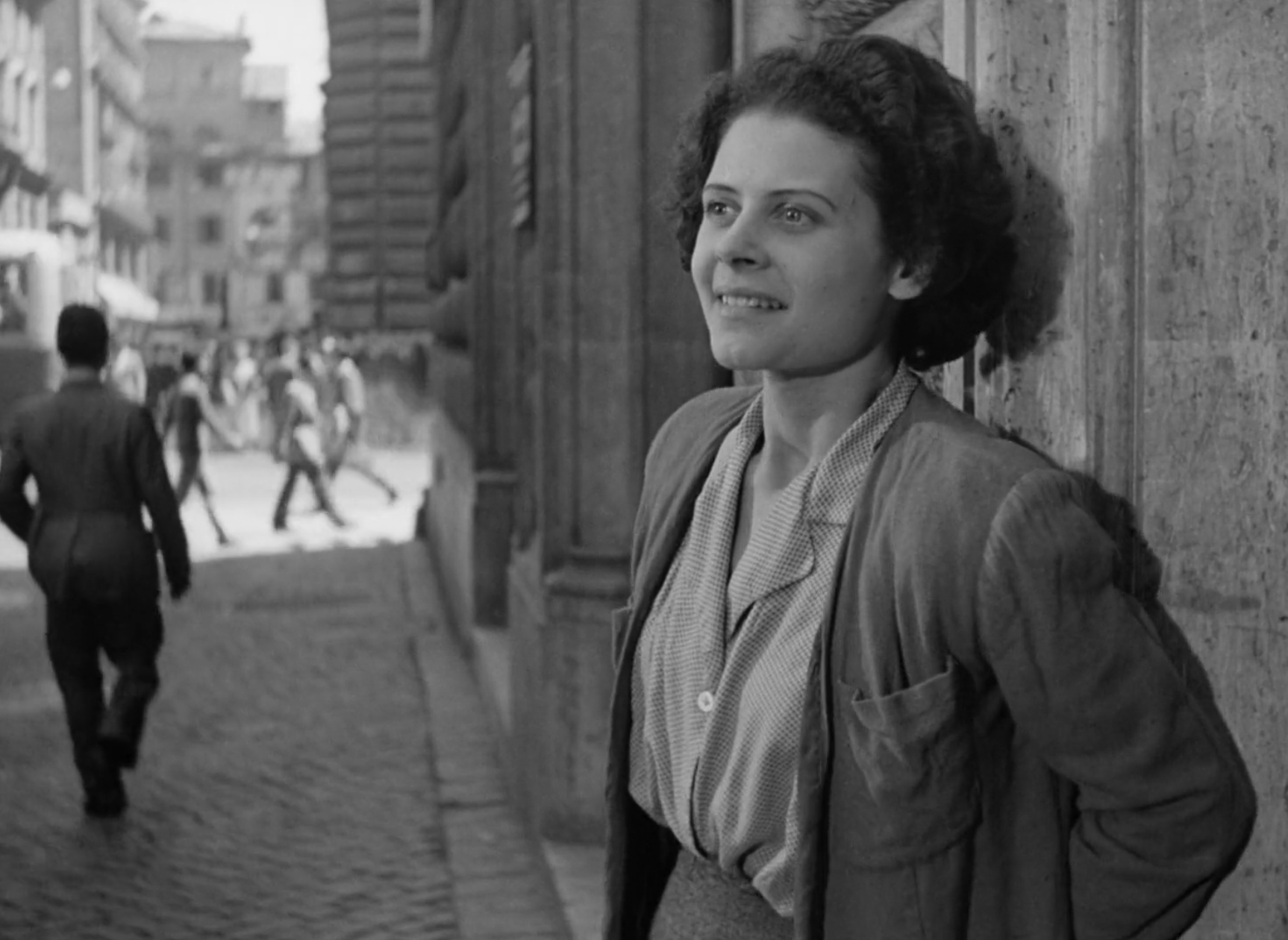Regia / Director: Vittorio De Sica, 1948
Antonio afferra la bicicletta non appena l'addetto la porta fuori. Un cartello affisso sopra lo sportello dice: "Ritiro non preziosi".
Antonio grabs his bicycle as soon as the clerk brings it out. A sign posted above the window reads “Low-value pickups.”
Antonio guarda la bicicletta con la felicità di un uomo che recupera un tesoro, anche se il sellino è consumato dall'uso. La spinge nell'atrio, dove Maria lo raggiunge, e insieme escono passando davanti alla fila di persone che aspettano di consegnare qualsiasi piccola cosa possiedano.
Un altro cartello dice: "Stima non preziosi", ma niente potrebbe avere più valore per Antonio della sua bicicletta, il mezzo che gli consentirà di mettere il cibo sulla tavola della sua famiglia.
Antonio looks at the bicycle with the happiness of a man retrieving a treasure, though the seat is worn from use. He pushes it into the lobby, where Maria meets him, and together they go out, past the line of people waiting to surrender whatever small thing they might possess.
Another sign says, “Low-value estimates,” but nothing could have more value to Antonio than his bicycle, the means to put food on his family’s table.
Antonio arriva al centro affissioni. Tenendo la bicicletta in equilibrio sulla spalla, attraversa una sala decorata con locandine cinematografiche: è venuto a reclamare il suo lavoro.
*"Attacchino" è il mestiere di affiggere manifesti per le strade della città.
Antonio arrives at the poster center. Holding the bicycle over his shoulder, he walks through a hallway decorated with movie posters: he has come to claim his job.
*“Attacchino” is the job of putting up posters in the city streets.
Cammina lungo un ampio corridoio fiancheggiato da scaffali in legno. In un arco in fondo all'inquadratura, sopra una porta, sono disposte simmetricamente delle locandine di film.
He walks down a broad hallway lined with wooden shelving. In an arch at the back of the shot, over a door, movie posters and a doorway are arranged symmetrically.
Un uomo con una scala attraversa l'inquadratura, creando brevemente una complessa geometria di linee parallele e convergenti. Antonio si avvicina a un tavolo ricoperto di documenti e chiede: "Dov'è il capufficio?"
L'impiegato indica: "È là!"
A man with a ladder walks through the frame, briefly creating a complex geometry of parallel and converging lines. Antonio approaches a table covered with documents, and asks, “Where’s the manager?”
The employee points: “He’s there!”
Mentre Antonio avanza, l'impiegato lo ferma: "E posala. Hai paura?" Ma Antonio tiene saldamente la sua preziosa bicicletta.
As Antonio moves on, the employee stops him: “Eh, put that down. Are you afraid?” But Antonio keeps a firm grasp of his precious bicycle.
Un uomo occhialuto si affaccia da una scrivania: "E posa questa bicicletta!"
"Scusi. Mi chiamo Ricci". La sua espressione brilla di eccitazione.
A bespectacled man looks up from a desk: “Eh, put that bike down!”
“Sorry. My name is Ricci.” His expression gleams with excitement.
Mette giù la bicicletta e si toglie educatamente il cappello. "Ricci Antonio".
He sets down the bicycle, and politely removes his hat. “Ricci, Antonio.”
Prendendo dalla tasca il documento di assegnazione del lavoro, dice: "Mi manda l'ufficio di collocamento di Val Melaina".
L'uomo lo guarda dubbioso ed esamina il suo raccoglitore.
Taking his job assignment document from his pocket, he says, “The employment office at Val Melaina sent me.”
The man looks at him dubiously and examines his binder.
"Ah!" Annuisce e lo chiama con un cenno.
Prendendo il documento di Antonio, dice: "Inizi domattina. Il magazzino ti darà la roba".
"Grazie. Buongiorno!"
“Ah!” He nods and beckons him.
Taking Antonio’s document, he says, “You start in the morning. The storeroom will give you the stuff you need.”
“Thank you. Have a good day!”
Antonio spinge la bicicletta nel corridoio. "Ciao!" dice all'impiegato più vicino.
"Addio!"
Antonio wheels his bike back out to the hallway. “Bye!” he says to the nearest employee.
“So long!”
Maria aspetta fuori. La macchina da presa la cattura mentre è immersa nei suoi pensieri, con la schiena appoggiata a un muro di pietra, mentre sullo sfondo la città, sfocata, brulica di attivita’. Quando vede Antonio, il suo volto si anima.
Maria is waiting outside. The camera catches her deep in thought, her back against a stone wall, while the bustling city bustles half in focus in the background. When she sees Antonio, her face comes alive
In un campo lungo, vediamo Antonio incorniciato da un alto arco. Alle sue spalle, delle scale appoggiate creano un disegno geometrico con le loro ombre.
In a long shot, we see Antonio framed inside a tall archway. Behind him, leaning ladders make a geometric pattern with their shadows.
Maria chiede: "Com'è andata?"
"È andata bene". Si scambiano uno sguardo affettuoso. "Hai dovuto aspettarmi, Mari’, ma è tutto a posto!"
Lei nota un pacco nelle mani di lui. "Che c'è qua?"
Maria asks, “How did it go?”
“It went well.” They exchange a loving gaze. “You had to wait for me, Mari’, but it’s all set!”
She notices a package in his hands. “What’s in this?”
"C'è un lavoro pure per te!" risponde.
Si toglie il borsalino e tira fuori dal pacco un berretto: dovrà indossarlo mentre appende i manifesti. "C'è da stringere il cinturino che mi balla!" Indossandolo, le mostra quanto è allentato. Ridono.
“There’s even a job for you!” he answers.
He takes off his fedora and pulls a cap out of the package: he is to wear it while he’s hanging posters. “You have to tighten the strap. It jiggles on me.” Putting it on, he shows her just how loose it is. They laugh.
Rimettendosi il suo borsalino, le prende il braccio. "Vieni qua. Guarda un po’".
Putting his fedora back on, he takes her arm. “Come here. Take a look.”
Appoggia la bicicletta al muro. Maria si mette in punta di piedi per vedere dentro la stanza. "Ognuno ha il suo scaffale!" esclama lui.
He leans his bike against the wall. Maria stands on tiptoe to see into the room. “Everyone has his own shelf!” he exclaims.
Prendendola per la vita, la solleva. "Lo vedi quanto è grande?" Ma proprio in quel momento qualcuno chiude l’imposta, bloccandole la vista.
Taking her by the waist, he hoists her up. “See how big it is?” But just then someone closes the shutter, blocking her view.
Mentre caricano l'attrezzatura di Antonio sulla bici, lui dice: "Pensa, prima davano pure le scarpe! Però... la paga è ancora buona!"
As they load Antonio’s gear onto the bike, he says, “Just think, they used to even give shoes! But the pay’s still good!”
"Seimila lire, più gli assegni familiari. E poi ci sono gli straordinari! Daje Mari’!"* Lui le prende affettuosamente il braccio e lei distoglie lo sguardo, ridendo. La speranza e la felicità li rincuorano: un nuovo inizio!
*”Daje” è un’esclamazione romanesca molto popolare. Il significato va da "Let's go!” (entusiasta) a “Here we go again…” (infastidito)."
“Six thousand lira, plus the family allowance. And then there’s overtime. Let’s go, Mari’!”* He takes her arm affectionately, and she looks away, laughing. Hope and happiness buoy them up: a new beginning!
*”Daje” is a very popular Romanesque exclamation. The meaning goes from “Let’s go” (enthusiastic) to “Here we go again.” (annoyed).
FINE PARTE 4
Ecco Parte 5 of this cineracconto! Subscribe to receive a weekly email newsletter with links to all our new posts.
















































